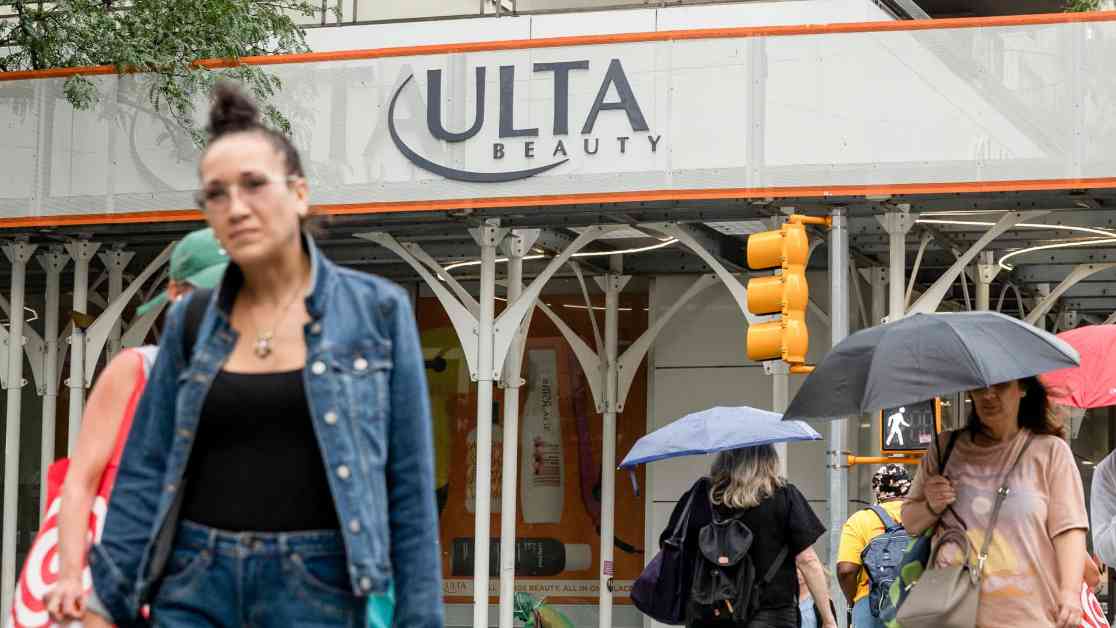Ulta Beauty, a popular beauty retailer, faced a setback in its recent quarterly performance, missing Wall Street expectations and subsequently trimming its guidance for the full year. The company’s shares plummeted by 7% in extended trading following the disappointing second-quarter results, particularly due to a decline in same-store sales during the period. This marked Ulta’s first earnings per share miss since May 2020 and its first revenue miss since December 2020.
The second quarter saw a notable 1.2% decrease in comparable sales compared to an 8% increase in the same period last year, falling significantly short of the 1.2% growth projected by analysts. Ulta’s CEO, Dave Kimbell, expressed disappointment over the performance, attributing it to various factors that adversely impacted store sales. These factors included an unforeseen operational disruption stemming from a change in store systems, lackluster promotional impact, cautious consumer spending behavior, and heightened competition in the beauty industry.
Kimbell acknowledged that Ulta’s market share was under pressure, with a decline in the prestige beauty sector driven by makeup and hair categories. Despite maintaining its share in mass beauty, Ulta experienced a loss in the prestige beauty sector according to data cited by Kimbell. The CEO noted that while temporary negative sales impacts are not uncommon due to competitors’ activities or new store openings, the scale and pace of change were particularly challenging this time around, affecting 80% of Ulta’s stores.
Despite the challenges faced, Kimbell remained optimistic about Ulta’s underlying strength and health, citing positive indicators in the company’s broader business such as guest engagement, new store impact, salon business success, and loyalty program growth. However, the company adjusted its full-year guidance, now expecting same-store sales to range from flat to a 2% decrease, down from the previous projection of 2% to 3% growth. Additionally, Ulta revised its revenue forecast to $11 billion to $11.2 billion, a decrease from the initial estimate of $11.5 billion to $11.6 billion, and adjusted earnings per share to $22.60 to $23.50, down from the previous range of $25.20 to $26.
The company’s performance in the second quarter ended August 3 fell short of Wall Street estimates, with earnings per share at $5.30 compared to the expected $5.46, and revenue totaling $2.55 billion versus the projected $2.61 billion. Net income for the quarter was reported at $252.6 million, or $5.30 per share, a decrease from $300.1 million, or $6.02 per share, in the same period the previous year. Despite the revenue increase to $2.55 billion from $2.53 billion in the prior year, the missed expectations weighed heavily on Ulta’s stock performance.
Earlier in the year, Warren Buffet’s Berkshire Hathaway disclosed a $266 million stake in Ulta Beauty, sending the company’s shares soaring. The investment was seen as validation that Ulta’s stock had been oversold, particularly after a 32% decline in 2024 up to that point, with a significant 26% decrease in the second quarter alone. The market response indicated investor confidence in Ulta’s potential despite the recent challenges faced by the company.
Ulta’s shares had been on a downward trend since CEO Dave Kimbell warned of cooling beauty demand at an investor conference in April. Kimbell had anticipated a pullback in sales, but admitted that it had occurred earlier and more significantly than expected. In response, the company outlined plans to boost sales, focusing on areas such as product assortment, brand relevance, digital consumer experience enhancement, loyalty program enhancement, and promotional strategies.
During the first-quarter earnings call in May, Kimbell detailed upcoming initiatives to drive sales, including expanding partnerships with delivery services, testing new gamification platforms, and leveraging marketing technology for personalized customer experiences. In the recent earnings call following the second-quarter results, Kimbell highlighted additional opportunities identified within the turnaround plan. These opportunities included relaunching Ulta’s beauty collection, introducing personalized product recommendations online, enhancing the rewards program through member-exclusive events, and offering tiered member-only promotions.
Despite the challenges faced in the current market environment, Ulta remains focused on adapting to changing consumer behavior and competitive pressures. The company’s commitment to innovation and strategic initiatives reflects its determination to overcome short-term setbacks and maintain long-term growth potential. As Ulta continues to navigate the evolving landscape of the beauty industry, stakeholders will be closely monitoring the company’s progress in implementing its turnaround plan and driving sustained performance in the future.






















